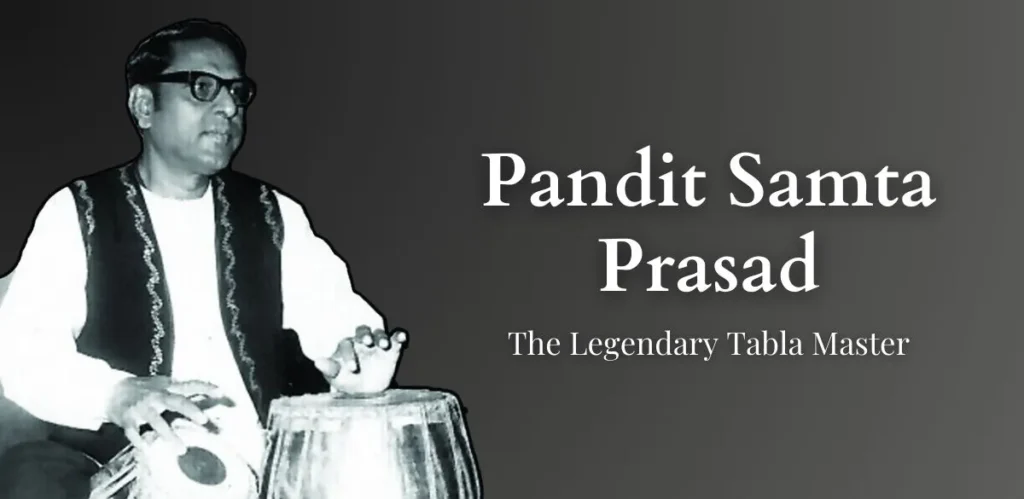Pandit Samta Prasad: The Legendary Tabla Maestro

Pandit Samta Prasad, popularly known as “Gudai Maharaj,” was one of the most renowned tabla players of India. Born in 1921 in Varanasi, he belonged to the famous Benares Gharana, a school of tabla playing known for its power, clarity, and intricate rhythmic compositions. His unparalleled mastery over tabla made him one of the greatest percussionists in Indian classical music.
He was trained under his father, Pandit Hari Sunder, and later received advanced training from Pandit Kanthe Maharaj, a stalwart of the Benares Gharana. Under their guidance, Shamta Prasad developed a playing style that combined speed, clarity, and powerful execution, making his performances electrifying and mesmerizing. His ability to maintain impeccable rhythm while executing complex compositions set him apart from his contemporaries.
Pandit Samta Prasad accompanied some of the greatest musicians of his time, including Pandit Ravi Shankar, Ustad Vilayat Khan, and Pandit Bhimsen Joshi. His accompaniment added depth and dynamism to their performances, earning him immense respect in the musical fraternity. He was also known for his solo performances, where he showcased the intricate and powerful compositions of the Benares Gharana with remarkable precision.
His contribution to Indian classical music was recognized with numerous accolades, including the prestigious Padma Shri award. His legacy continues through his recordings, students, and the influence he left on the tabla tradition. Despite his passing in 1994, his impact on Indian classical music remains profound, and his name is revered among percussionists and music lovers worldwide.
Pandit Samta Prasad, also known as Gudai Maharaj, was one of the greatest tabla players of the Banaras Gharana. His mastery over rhythm and exceptional command over tabla compositions made him a legendary figure in Indian classical music.
Early Life and Training
Born in 1921 in Varanasi, Pandit Samta Prasad was initiated into tabla playing at an early age. He was trained by his father, Pandit Hari Sundar Prasad, and later honed his skills under the guidance of Pandit Kanthe Maharaj. His training in the Banaras Gharana emphasized clarity, speed, and intricate rhythmic patterns.
Musical Journey and Contributions
Pandit Samta Prasad’s tabla performances were known for their power, precision, and aesthetic beauty. He accompanied some of the greatest musicians of his time, including:
•Ustad Bismillah Khan (Shehnai)
•Pandit Ravi Shankar (Sitar)
•Ustad Vilayat Khan (Sitar)
•Girija Devi (Vocal)
His solo performances were equally mesmerizing, showcasing his deep understanding of tala (rhythm) and intricate compositions.
Awards and Recognition
For his extraordinary contribution to Indian classical music, Pandit Shamta Prasad received several prestigious awards, including:
•Padma Shri (1972) – One of India’s highest civilian honors.
•Sangeet Natak Akademi Award (1987) – Recognizing his excellence in tabla playing.
•Tansen Samman – A prestigious award for Hindustani classical musicians.
Legacy and Influence
Pandit Samta Prasad’s influence on tabla playing continues to inspire generations of percussionists. His recordings, performances, and disciples have kept the Banaras Gharana tradition alive. His contribution to film music, particularly in Satyajit Ray‘s movies, further cemented his place in India’s musical history.
Conclusion
Pandit Samta Prasad was not just a tabla player but a musical genius who elevated the art of percussion. His rhythm, speed, and clarity remain unparalleled, making him an immortal figure in Indian classical music.